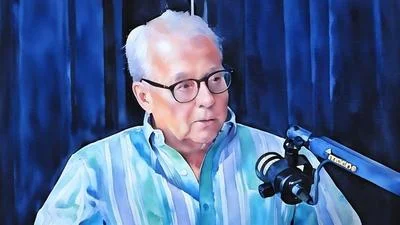Ralph DiPalma, a volunteer minister associated with Last Chance Ministries, said agencies that seek to help homeless people mired in substance abuse are doing them no favors by designating many of them as mentally ill.
In fact, DiPalma argued, agencies are assisting in homeless people's addiction while ensuring they have enough clients to keep their organizations busy, and revenue flowing in.
“For two or three decades, the definition of mentally ill has been changed from what we traditionally have called mentally ill. And that has been deliberate,” he said. “The people who are receiving the federal money for the mentally ill homeless have lobbied in both Washington and Santa Fe to include people who are addicted to drugs and alcohol.”
DiPalma has been working with Albuquerque’s homeless population for more than 50 years. Last Chance Ministries is essentially a street ministry that works with volunteers from other organizations and ministries.
As of 2021, the number of homeless people in Albuquerque is estimated at more than 1,500. This number is roughly consistent with the estimated numbers from 2019.
Substance abuse is more prevalent among homeless populations than those who have homes. The abuse is likely the result of the stress that comes with being homelessness, rather than the other way around, according to the National Coalition for the Homeless, of many people begin using drugs or alcohol as a way of coping with the pressures of homelessness.
DiPalma said there is a disagreement among psychiatrists and psychologists on substance abuse and mental illness.
“There are two camps that disagree with that expansion of the definition of mentally ill to include people who are addicted to drugs and alcohol. They have called it co-occurring or dual diagnosis,” he said. “Which simply means they have a mental disorder and an addiction to either drugs or alcohol at the same time, an ongoing mental disorder and an ongoing addiction.
"But we have found, for more than 50 years, that many of these people if they’re put into a successful drug and alcohol program, have come back to … much closer than they were to before they began to use some drugs or alcohol, to a sober mind,” he added.
DiPalma said local newspaper articles have not been well researched and have swayed public opinion and government policy. He said city homeless contractors, especially Health Care for the Homeless, have guided reporters to depict a large portion of Albuquerque’s homeless population as severely mentally ill when it’s their addiction to alcohol and drugs that are at the root of their problems.
“This is the truth," he said. "And the taxpayers and the voters and the people who are listening to these stories put out by the media have been misled and bamboozled. I'm not saying it’s deliberate on the part of all the reporters, but [they] could have asked more questions and they have not. That’s our complaint, that the media could have investigated more and they have refused.”
He said he has been told by journalists that they are not experts in this field, nor do they consider themselves investigative reporters. But their work has a real impact.
“And these individuals are being called severely mentally ill,” DiPalma said. “It is something going on all over the country because the homeless contractors refuse, and have refused for at least two decades, to utilize the empty beds in the Christian and private successful drug and alcohol programs. We’ve offered to pay for the bus tickets. They’ve refuse to even call to find out if there are empty beds. And this has been going on for 25 years.”
He said there is a simple, and maddening, explanation.
“What is the reason, a person may ask? And our answer has always been is because they need the clients,” DiPalma said. “They don’t want anyone to interfere with their caseworkers and their therapists continuing to maintain a high level number of mentally ill clients because there is a huge amount of money designated for the homeless (who are) mentally ill. And that has come about by their lobbying both in Washington and Santa Fe. It's deliberate.”
He said he has witnessed the change in people provided with proper treatment for their addictions.
“If we did not see an ongoing number come back to the right mind after they’ve gone through six months or a year or more in the successful programs, then we would not make that claim,” DiPalma said. “But this has been going on for almost three decades now, where we have witnessed the same people they’re calling severely mentally ill come back to a normal life, a rational mind, a sober mind.”
DiPalma said people he talks with are using heroin, methadone, methamphetamine and fentanyl, which is relatively new on the scene and very deadly.
Dealers are mixing their own drugs to sell, not knowing what chemicals are being combined. That leads to overdoses, misery and in some cases, deaths.
The needle exchange program is a farce, DiPalma said.
“It's caused more trouble," he said. "It's not exchange, it’s distribution. It's hiding behind needle exchange. That's the name of it. It's hiding behind harm reduction. But the truth is it’s caused more harm than anything else in Albuquerque.”
He said longtime users are teaching new, impressionable people how to obtain needles and drugs. People who would never have become hard drug users are led into addiction, DiPalma said.
Medical workers are using Narcan — the brand name for naloxone, a medicine that rapidly reverses an opioid overdose — at higher and higher rates, he said. But deaths continue.
Drug addicts are being given test strips to determine what chemical they are placing into their bodies, DiPalma said. It only keeps drug use high, in his view.
There are dozens of open beds available in local treatment centers. But the addicts don’t want to go, he said, and the word is spread across the state that Albuquerque is a safe place to live and use drugs.
DiPalma said this is a growing problem across the country.
“But Albuquerque is worse than other cities because the government, the state and city governments, provide no drug testing, free apartments," he said. "No drug testing, motel rooms. No drug-testing food stamps. If you are evicted from the apartment, we'll get you another one. If you are evicted from the motel room, we'll get another one.”
The Albuquerque Police Department is ordered to stand back, DiPalma said. He said his group has made 4,000 phone calls in the past six years, urging the city to get out-of-control homeless away from the truly mentally ill.
“It’s a vigilante atmosphere,” DiPalma said.
He said many homeless people fear going to the Westside Emergency Housing Center, formerly a jail, with numerous reports of staff members stealing backpacks, cellphones and money. They simply don’t feel safe there.
DiPalma said he and his group requested meetings with Mayor Tim Keller before he took office, and did talk with his staffers. They sent certified letters but received no response.
At a recent news conference, a senior staffer told him flat-out that his ideas were not welcome, he said.
"He said, ‘We don’t agree with you. We don’t agree with your way of doing things,’” DiPalma said. “When he said we, he means the mayor. We went to one meeting, which they never asked us back again.”





